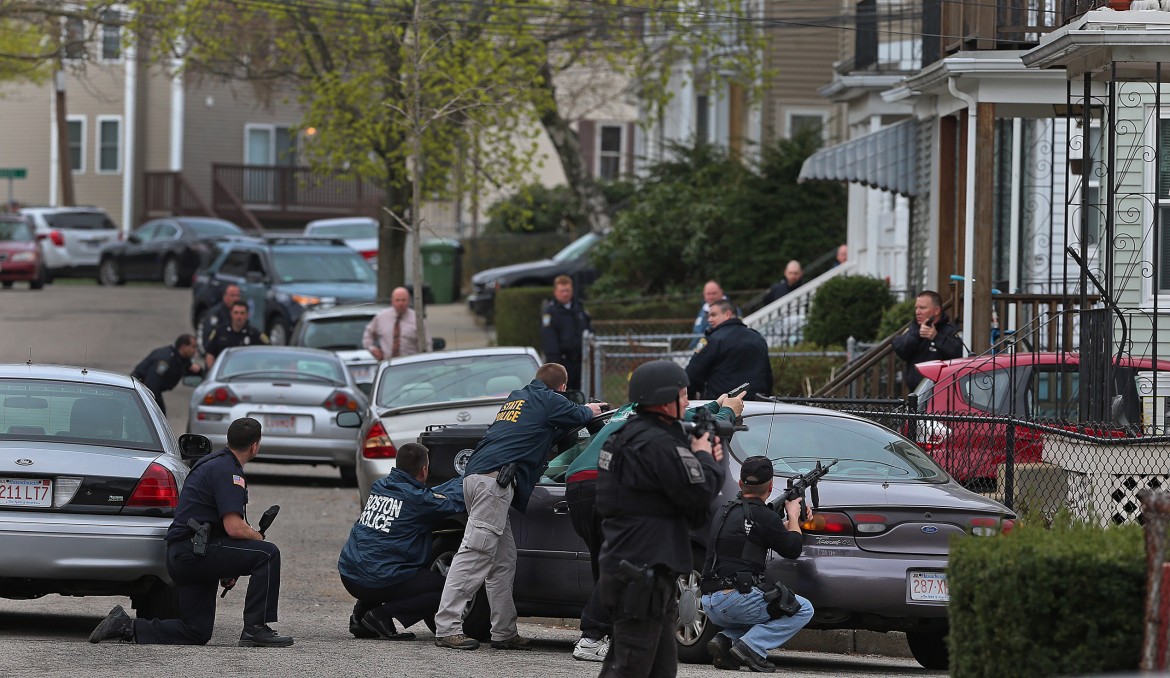TORONTO – The city of Boston and its residents are on lockdown.

Emergency officials urged the communities of Watertown, Newton, Waltham, Belmont, Cambridge and the Allston-Brighton neighbourhoods to stay indoors.
Children didn’t head to school. Parents didn’t commute to work. A city was shut down, its daily grind halted in its tracks as police continued their manhunt for a single living suspect linked to the Boston Marathon bombings on Monday.
Read more: Locking down the city of Boston
City dwellers are left with their families, their television sets and Internet for a glimpse of what’s going on outside their doors.
Being shut in, knowing SWAT teams, sharpshooters, FBI agents and helicopters surround you can be terrifying, will lingering effects, Dr. Nancy Wilkinson told Global News.
“When people are at home and they are told they cannot go out, it creates an anxiety and a fear – those are the two symptoms you feel.”
“They’re getting the play-by-play, a visual of the SWAT teams coming in and all of the police presence – these events have such a strong visual. To hear the anxiety in the broadcaster, it just grabs you,” Wilkinson said.
From our homes in Canada, we are riveted by the coverage. In Boston, their neighbourhoods have turned to crime scenes being combed through by investigators.
- Canadian man dies during Texas Ironman event. His widow wants answers as to why
- Invasive strep: ‘Don’t wait’ to seek care, N.S. woman warns on long road to recovery
- ‘Sciatica was gone’: hospital performs robot-assisted spinal surgery in Canadian first
- ‘Super lice’ are becoming more resistant to chemical shampoos. What to use instead
Wilkinson is a registered psychologist at Lakeridge Health in the Durham region of Ontario and has practiced for 25 years, working with kids, adults and teenagers who have experienced trauma, depression or anxiety.
Read more: How the Boston Marathon bombings impact the public psychologically
For some in Boston, these anxious sentiments will linger as the week’s tragic events take a toll on Americans.
Some people may be hyper vigilant, they’ll keep away from public spaces or they’ll avoid areas that are within the vicinity of the bombings, for example.
What’s pivotal is that authorities offer closure and a return to safety to help these concerns dissipate.
So long as the suspect is on the loose, or the motive of the bombings remains unclear, there will be questions.
“That will keep the fear heightened,” Wilkinson said.
But eventually, for the most part, the public worry will abate and life will return to its regular routine.
For some, especially those already dealing with depression, or an existing trauma, the concern may be overwhelming. It could even trigger flashbacks to their previous experiences.
If the fear lingers beyond a couple of days, people could be entering into acute stress reaction. If it lasts beyond a month, they could be dealing with PTSD – or post traumatic stress disorder.
In these cases, patients should seek help from professionals to help them cope with their feelings.
In the meantime, families should limit how much coverage they’re watching, especially if they’re not in the areas police have zeroed in on, Wilkinson said.
Keep your kids away from following the news as well – Wilkinson advised this measure because it’s unclear how youth may be processing what’s going on.
Read more: How to talk to your kids about the Boston Marathon bombings
Instead, parents need to reassure their kids that they’re safe and distract them with other activities. Keep your kids close though, to let them know that you’re there and answer any questions they may have.
The ripple effects have likely made their way over to runners around the globe, including Canada, said Dr. Oren Amitay, a Toronto-based registered psychologist.
“The whole thing with trauma is this idea of having absolutely no control over what’s going to happen. That’s what makes trauma have such an impact,” he told Global News.
As investigators plug away at the many questions that remain unanswered, Amitay suggested Canadians could be hesitant, second-guessing runs they’ve signed up for. It’s a knee-jerk reaction.
“It’s visceral. Even just seeing it, if you’re a runner your mind can see itself there so you have that physiological reaction that ties in with emotion, fear, panic. It’s the idea of it could happen to me, or it could happen here. That’s what terrifies people,” Amitay said.
carmen.chai@globalnews.ca
Follow @Carmen_Chai




Comments